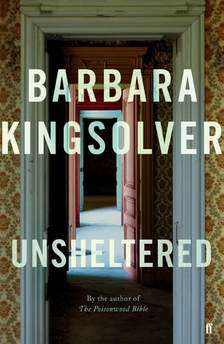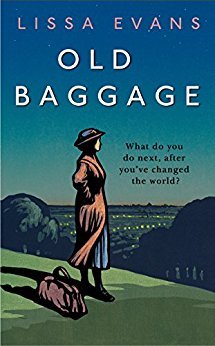Unsheltered by Barbara Kingsolver
Fortunately, she’s inherited her aunt’s house in Vineland, New Jersey, but that, Willa soon discovers, has no foundations and is falling down. Tig, her hippyish mid-twenties daughter, has moved in with her parents after making a separate life for herself in Cuba, and won’t say why she’s back. Another less welcome member of the household is foul-mouthed father-in-law Nick, with multiple medical needs the family insurance might not meet. Then tragedy brings a third generation to the household in the form of grandson Aldus, as a result of his mother’s suicide and his father’s need to pay off his student loan.
Alternate chapters, set in the same house in 1871, show that even early in its history, Vineland wasn’t the utopia its founder, Charles Landis, claimed it to be. Or at least not to newly appointed science teacher, Thatcher Greenwood, whose attempts to bring rationality to the curriculum are repeatedly blocked by the high school head. His new wife is more concerned with fashion than logic and – like Rosamond Vincy, the pretty and petty wife of Tertius Lydgate in Middlemarch – might be the ruin of him. He does have an ally in her sister, Polly, but she’s only twelve. So the reader can’t help rejoice when he’s befriended by his eccentric neighbour, Mary Treat, correspondent of Charles Darwin, genuine historical figure, and biologist with a special interest in insects and ferns. When Thatcher first meets her, she’s sitting with a finger in a Venus fly trap to check its digestive powers.
A dual narrative takes a little longer to get into, but Barbara Kingsolver weaves threads of connecting detail across the chapters until the stories take shape. While I found this appealing, I wasn’t sure I was going to enjoy the novel overall as much as I’d hoped. Sometimes I find myself exhausted by the digging necessary to unearth a novel’s theme, but it can be equally unsatisfying to witness it parading nakedly on the surface. Just in case we miss the symbolism of the crumbling house beyond repair, Willa’s family conduct textbook debates around the dinner table on climate change, the collapse of capitalism and the madness of American healthcare. I was more tolerant of the depiction of the more distant horrors of women’s ignorance and indolence in the nineteenth century, although the parallels with today in concepts of appropriation and truth were perhaps a little laboured. At least Trump was unnamed, and his historical counterpart, Charles Landis, another real person, a novelist’s dream.
Soon, however, I was sufficiently absorbed in the stories of both families to be less irritated about the author delivering a message. And, while often suspicious of happy endings, I admired the tinge of optimism in Barbara Kingsolver’s message about the end of civilisation as we know it. Unsheltered, we’re exposed to the elements, but we also get an unimpeded vision of the sky. Some of what we took for shelter might have been delusional; lift the veil and perhaps we’ll find another way through. Maybe the fool, the dropout, the black sheep of the family, is wiser than we think. Thanks to Faber books for my review copy.
Old Baggage by Lissa Evans
When an old friend turns up at one of Mattie’s lectures, the women are shaken. Jacko and her husband, fans of Mussolini, are on a mission to convert London’s youth to an unpleasant brand of patriotism. But this gives Mattie an idea how she too can inspire the next generation of potential female voters. Thus the Amazons are born, with Ida as founder member.
Meeting on the heath on Sunday afternoons, the club is everything Jacko’s militaristic league isn’t. Within the group, hierarchies are toppled, questioning encouraged, along with fresh air and exercise. It seems ideal until Inez joins. The other girls can’t understand why Mattie seems to favour her when she shows not a shred of enthusiasm or initiative.
Inez connects Mattie with some old baggage, and not only because her deceased mother came to her house to be nursed back to health after a hunger strike. Compassionate, principled and generally indifferent to what others think of her, Mattie has a blind spot, which comes to threaten the community into which she’s channelled so much energy and to hurt the people who love her best.
From the blurb – which summarises Old Baggage as “a funny and bittersweet portrait of a woman who has never, never given up the fight” – I expected a comic novel. With a Matty of my own carrying pathos and humour in my possibly third novel, Matilda Windsor Is Coming Home, I was curious to see how Lissa Evans pulls it off. But I didn’t laugh once, and that’s not a complaint! I actually found the novel extremely moving.
Mattie might be flawed, but who isn’t? As a free thinker, despite the limits of her education, and a socialist, despite the limits of her class, she’s much to be admired. She might be eccentric, but that may be part of what enables her to recognise the emperor has no clothes. Lissa Evans might depict her with a lightness of touch, but that doesn’t detract from the seriousness of her story. Perhaps I’m being oversensitive, but the downplaying of the novel in the blurb seems, not necessarily consciously, part of the belittling of women’s achievements we still need people like Mattie to fight against a hundred years on.
Another contender for my novel of the year, Old Baggage is published by Doubleday to whom thanks for my review copy.
























 RSS Feed
RSS Feed





















